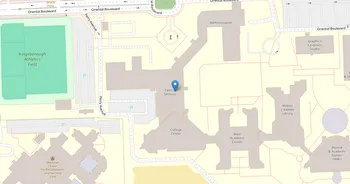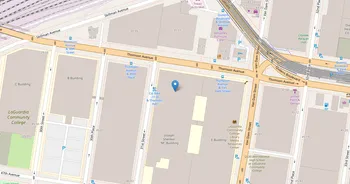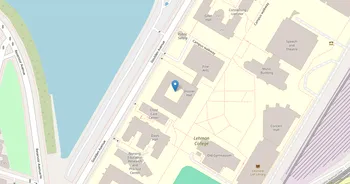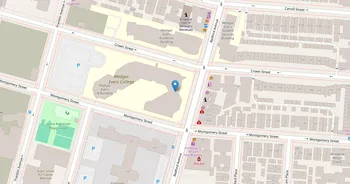CUNY John Jay College of Criminal Justice : Overview, Courses, Scholarships & Rankings
About CUNY John Jay College of Criminal Justice
Built around the idea of justice, this CUNY college sits in Midtown, close to museums, media, and civic institutions. It's known for strengths in criminal justice, social sciences, psychology, law related studies, and investigative fields, all grounded in clear writing and research. Teaching goes hands-on with cases, labs, and community projects that link big ideas to city life.
The campus mixes light filled classrooms and labs with a quiet library, support hubs, and a rooftop commons, plus advising, tutoring, counseling, and a career office that lines up internships with city agencies, nonprofits, and courts. Clubs are service minded, with arts, culture, and intramurals in the mix. The vibe is purpose driven, diverse, and commuter friendly. And the location brings guest speakers and networks that help turn classwork into a first job.
Key Institutional Details
Contact & Profile
Academic & Institutional
Academic Programs & Fields of Study
CUNY John Jay College of Criminal Justice offers 37 degree programs across 15 major academic fields, graduating approximately 3,605 students annually. The most popular fields by graduate volume are Security & Safety (13 programs, 1,954 graduates), Psychology (1 programs, 624 graduates), Social Sciences (7 programs, 400 graduates), Computer & IT (1 programs, 193 graduates) and Public Services (2 programs, 157 graduates). Explore program details, award levels, and graduate demographics below.
Security & Safety (13 programs, 1,954 graduates)
Emergency Management, Law Enforcement and Public Safety
| Program Name | Graduates | Gender Distribution | Award Levels | CIP Code |
|---|---|---|---|---|
| Criminal Justice Administration | 1,432 |
|
Bachelor's
Postbac Cert.
Master's
|
43.0103 |
| Criminal Justice, Other | 112 |
|
Bachelor's
Master's
|
43.0199 |
| Forensic Science and Technology | 76 |
|
Bachelor's
Master's
|
43.0406 |
| Criminal Justice and Police Science | 62 |
|
Postbac Cert.
|
43.0107 |
| Financial Forensics and Fraud Investigation | 62 |
|
Bachelor's
Postbac Cert.
Other Award
|
43.0405 |
| Securities Services Management | 53 |
|
Bachelor's
Master's
|
43.0112 |
| Terrorism and Counterterrorism Operations | 36 |
|
Postbac Cert.
|
43.0304 |
| Cyber and Computer Forensics | 32 |
|
Postbac Cert.
Master's
|
43.0403 |
| Law Enforcement Investigation and Interviewing | 27 |
|
Postbac Cert.
|
43.0114 |
| Crisis and Emergency Management | 26 |
|
Postbac Cert.
Master's
|
43.0302 |
| Fire Services Administration | 18 |
|
Bachelor's
|
43.0202 |
| Fire Science and Firefighting | 13 |
|
Bachelor's
|
43.0203 |
| Law Enforcement Intelligence Analysis | 5 |
|
Postbac Cert.
|
43.0408 |
Psychology (1 programs, 624 graduates)
Psychological Sciences, Mental Health and Behavioral Studies
| Program Name | Graduates | Gender Distribution | Award Levels | CIP Code |
|---|---|---|---|---|
| Forensic Psychology | 624 |
|
Bachelor's
Postbac Cert.
Master's
|
42.2812 |
Social Sciences (7 programs, 400 graduates)
Sociology, Anthropology and Political Science Studies
| Program Name | Graduates | Gender Distribution | Award Levels | CIP Code |
|---|---|---|---|---|
| Criminology | 167 |
|
Bachelor's
|
45.0401 |
| Political Science and Government | 100 |
|
Bachelor's
|
45.1001 |
| Economics | 49 |
|
Bachelor's
Master's
|
45.0601 |
| International Relations | 36 |
|
Master's
|
45.0901 |
| Sociology | 35 |
|
Bachelor's
|
45.1101 |
| Social Sciences | 7 |
|
Bachelor's
|
45.9999 |
| Anthropology | 6 |
|
Bachelor's
|
45.0201 |
Computer & IT (1 programs, 193 graduates)
Computer Science, Information Technology and Cybersecurity
| Program Name | Graduates | Gender Distribution | Award Levels | CIP Code |
|---|---|---|---|---|
| Information Systems Security and Auditing | 193 |
|
Bachelor's
|
11.1003 |
Public Services (2 programs, 157 graduates)
Public Administration, Social Work and Community Services
| Program Name | Graduates | Gender Distribution | Award Levels | CIP Code |
|---|---|---|---|---|
| Public Administration | 145 |
|
Bachelor's
Master's
|
44.0401 |
| Community Organization and Advocacy | 12 |
|
Master's
|
44.0201 |
Health (2 programs, 115 graduates)
Healthcare Professions, Medical Sciences and Clinical Practice
| Program Name | Graduates | Gender Distribution | Award Levels | CIP Code |
|---|---|---|---|---|
| Mental Health Counseling | 111 |
|
Master's
|
51.1508 |
| Health Administration and Management | 4 |
|
Postbac Cert.
|
51.0701 |
Biological Sciences (2 programs, 38 graduates)
Life Sciences, Biotechnology and Biomedical Research
| Program Name | Graduates | Gender Distribution | Award Levels | CIP Code |
|---|---|---|---|---|
| Cell and Molecular Biology | 32 |
|
Bachelor's
|
26.0406 |
| Toxicology | 6 |
|
Bachelor's
|
26.1004 |
Interdisciplinary (1 programs, 36 graduates)
Cross-Disciplinary Studies and Integrated Research Programs
| Program Name | Graduates | Gender Distribution | Award Levels | CIP Code |
|---|---|---|---|---|
| Dispute Resolution | 36 |
|
Other Award
|
30.2801 |
English (1 programs, 25 graduates)
English Literature, Creative Writing and Literary Analysis
| Program Name | Graduates | Gender Distribution | Award Levels | CIP Code |
|---|---|---|---|---|
| English Language and Literature | 25 |
|
Bachelor's
|
23.0101 |
History (1 programs, 14 graduates)
Historical Studies, Cultural Heritage and Archaeological Research
| Program Name | Graduates | Gender Distribution | Award Levels | CIP Code |
|---|---|---|---|---|
| History | 14 |
|
Bachelor's
|
54.0101 |
Admission Requirements & Test Scores
Comprehensive overview of admission criteria, standardized test score ranges, and application requirements for prospective students at CUNY John Jay College of Criminal Justice.
Application Requirements
Data based on IPEDS for 2022-2023 academic year. Test score ranges represent the middle 50% of admitted students (25th-75th percentile). Requirements may vary by program.
Tuition, Fees & Estimated Costs
Overview of tuition rates, housing, and other annual education expenses for undergraduate and graduate students
Financial Aid & Student Support
Summary of scholarships, grants, student loans, and financial aid statistics for undergraduate students
Student Success Metrics
Graduation rates and post-graduation earnings to help assess student outcomes and long-term value of education.
Loan Burden & Repayment Outcomes
Breakdown of loan repayment rates and student debt levels by income and dependency status.
Frequently Asked Questions
Find answers to the most common questions about CUNY John Jay College of Criminal Justice
How much does it cost to attend CUNY John Jay College of Criminal Justice?
The annual tuition at CUNY John Jay College of Criminal Justice is $7,470 for in-state students and $15,420 for out-of-state students. When including room and board, books, and other expenses, the total estimated cost is approximately $8,970 for in-state students and $16,920 for out-of-state students. Additional costs include room and board $21,788 (off-campus) and books and supplies $1,500.
Data based on IPEDS program completions for 2022-2023 academic year. Tuition and cost estimates are approximate and may not include all fees, personal expenses, or transportation costs.
What academic programs and degree levels does CUNY John Jay College of Criminal Justice offer?
CUNY John Jay College of Criminal Justice offers 37 academic programs across 15 major fields of study, with available degree levels: Associate's, Bachelor's, Postbac Cert., Master's, Post-Master's, Other Award.
Most popular program areas include:
- Emergency Management, Law Enforcement and Public Safety (13 programs)
- Psychological Sciences, Mental Health and Behavioral Studies (1 programs)
- Sociology, Anthropology and Political Science Studies (7 programs)
- Computer Science, Information Technology and Cybersecurity (1 programs)
- Public Administration, Social Work and Community Services (2 programs)
Data based on IPEDS program completions for 2023-2024 academic year. Numbers reflect programs where students graduated, not all offered programs.
What is the acceptance rate for CUNY John Jay College of Criminal Justice?
CUNY John Jay College of Criminal Justice has an 57.2% acceptance rate and a 19.8% yield rate, making it selective.
Admission statistics breakdown:
- Total applicants: 17,921
- Students admitted: 10,255
- Students enrolled: 2,033
Data based on IPEDS for 2022-2023 academic year. Admission statistics may vary by program and application cycle.
What financial aid and scholarships are available at CUNY John Jay College of Criminal Justice?
CUNY John Jay College of Criminal Justice provides financial aid to 15% of first-time, full-time students, with average grants of $9,284 and average loans of $10,927.
Average financial aid amounts by type:
- Pell grants: $5,923
- State/Local grants: $4,061
- Institutional grants: $1,030
- Federal loans: $4,849
The university supports 1,617 students with grants and 126 students with loans annually.
Data based on IPEDS for 2022-2023 academic year. Financial aid amounts and percentages may vary by program, enrollment status, and individual circumstances.
What is the average salary for CUNY John Jay College of Criminal Justice graduates?
CUNY John Jay College of Criminal Justice graduates earn a median salary of $50,293 after 6 years and $56,195 after 10 years.
The salary range 10 years after graduation spans from $35,780 (25th percentile) to $80,288 (75th percentile), with top earners reaching $95,600 (90th percentile).
Data based on IPEDS for 2022-2023 academic year. Salary data reflects graduates who received federal financial aid (approximately 60% of all graduates). Actual earnings may vary significantly based on program, location, and individual circumstances.
Related Universities




Found something useful? Help others discover it too! Share with friends, on social media, or save for later - every share helps someone find the information they need.